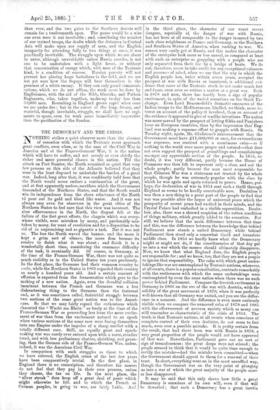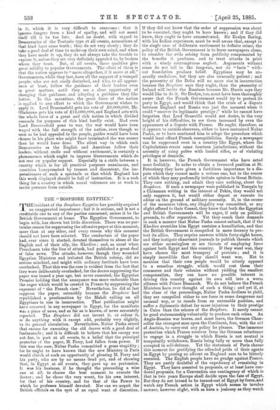THE DEMOCRACY AND THE CRISIS.
NOTHWG strikes a quiet observer more than the absence of sensation with which the Teutonic races approach great conflicts, even when, as in the case of the Civil War in America and of the Franco-German• War, it is the nation which will have to suffer, and not merely or even chiefly the richer and more powerful classes in the nation. Till the attack on Fort Sumter, the North remained so quiet that very few persons on this side of the Atlantic believed that they were in the least dispased to undertake the burden of a great war. Indeed, long after that, it was confidently held here that the North would never endure a continuation of the great, and at first apparently useless, sacrifices which the Government demanded of the Northern States, and that the South would win its independence from the sheer reluctance of the North to pour out its gold and blood like water. And it was not always easy even for observers in the great cities of the Northern States to feel sure that this view was incorrect. The slow effervescence in the North, the disgust felt at the failure of the first great efforts, the chagrin which was everywhere visible, were mistaken by many, and pardonably mistaken by many, for want of resolution and for a disposition to be rid of so unpromising and so gigantic a task. But it was not so. The less the North waved the banner, and the more it kept a grim sort of silence, the more firm became its resolve to finish what it was about ; and finish it in a wonderfully short time, considering the enormous difficulty of the task, it eventually did. Of course, in Germany, at the time of the Franco-German War, there was not quite so much stolidity as in the United States ten years previously. In the first place, the Germans had their common country to make, while the Northern States in 1861 regarded their country as nearly a hundred years old. And a certain amount of effusion is expected from the fermentation which goes to the making of a new nation. Again, even the dreadful collision imminent between the French and Germans was a less disheartening thing to the Germans than the fraternal and, as it was sometimes called, fratricidal struggle between two sections of the same great nation was to the Americans. So that we may fairly regard the enthusiasm which chaunted the " Wacht am Rhein" so freely at the time of the Franco-German War as proceeding less from the mere excitement of war than from the excitement natural to an epoch when various sections of the same race were fusing themselves
into one Empire under the impulse of a sharp conflict with a totally different race. Still, no equally great and epochmaking war was surely ever entered upon with a surer, steadier tread, and with less preliminary chatter, shrieking, and groaning, than the German side of the Franco-German War, unless, indeed, it was the American Civil War.
In comparison with such struggles as those to which we have referred, the English crises of the last few years have been comparatively trivial. In the first place, in England there is no conscription, and therefore the masses do not feel that they pay in their own persons, unless they choose, the tax on life. In the next place, the silver streak" does keep off a great deal of panic which might otherwise be felt, and to which the French or German peoples, in going to war, are fairly liable. And in the third place, the character of our worst recent dangers, especially of the danger of war with Russia, has not been at all comparable to the danger incurred by two such close neighbours as France and Germany, or the Northern and Southern States of America, when rushing to war. We cannot very easily get at Russia, and this makes the character of the enterprise look more or less unreal, as compared at least with such an enterprise as grappling with a people who are only separated from their foe by a bridge of boats. We do not, therefore, mean to take credit for any exceptional calmness and presenc? of mind, when we say that the way in which the English people has, twice within seven years, accepted the prospect of war with Russia as imminent, is additional evidence that races of the Teutonic stock do not make much fret and fume, even over so serious a matter as a great war. Both in 1878 and now, there has hardly been a sign of popular excitement, in spite of the varied sensations on the Stock Exchange. Even Lord Beaconsfield's dramatic summons of the Indian troops to the Mediterranean, kindled, we think, more interest on account of the policy -it involved, than on account of the evidence it appeared to give of warlike intentions. The nation was more moved by the prospect of letting Sikhs and Punjabees loose on European countries, than by the impression that England was making a supreme effort to grapple with Russia. On Tuesday night, again, Mr. Gladstone's announcement that the Government must have £11,000,000 at once, for extraordinary war expenses, was received with a unanimous calm—as if nothing in the world were more proper and natural—that does not even suggest the prospect of grumblings and complainings amongst any appreciable section of the people. In 1854, no doubt, it was very different, partly because the House of Commons was then felt to represent only a class, and not the whole people ; partly because the man most responsible for that Crimean War was a statesman not trusted by the whole people, though he was extremely popular with the class by which he was again and again returned to power. Hence, perhaps, the declaration of war in 1854 sent such a thrill through England as seems to be hardly conceivable now. Doubtless it was then a new thing to a great part of the people to find that war was possible after the hopes of universal peace which the prosperity of recent years had excited in their minds, and the Crystal Palace had embodied in a visible superstition. Doubtless, also, there was a shrewd suspicion of the rotten condition of things military, which greatly added to the sensation. But still, we believe that the main difference between that time and this, was the difference between the knowledge that behind Parliament now stands a united Democracy, while behind Parliament then stood only a somewhat timid and irresolute middle class. In 1854 we hardly knew what the Democracy might or might not do, if the constituencies of that day got us into a war which the masses should ultimately disapprove. Now, we know that what England does, the English people are responsible for ; and we know, too, that they are not a people to ignore that responsibility. The calm with which great undertakings like war are contemplated by Teutonic nations, wherever, at all events, there is a popular constitution, contrasts remarkably with the restlessness with which the same undertakings were contemplated by even the same nation when there was no such power behind Parliament.. Compare the feverish excitement in Germany in 1866 on the eve of the war with Austria, with the solidity of the great movement of 1870, when it was perfectly well-known that all Germany was united, and you see the differ ence in a moment. And the difference is even more curiously visible when we compare the unmoved calm of 1878 and 1885 with the effervescence of nervous anxiety which so many can still remember as characteristic of the, crisis of 1854. The truth is that Teutonic nations, at all events when conscious of complete control of their own destinies, do not seem to fret much, even over a possible mistake. It is pretty certain from the result, that bad there been war with Russia in 1878, a very great proportion of the people would not have approved of that war. Nevertheless, Parliament gave out no sort of sign of tremulousness ; the great deeps were not stirred ; the people seemed to think that it would be quite time enough to rectify the mistake—had the mistake been committed—when the Government should appeal to them for a renewal of their trust. In short, everything went on in the most unruffled way, though the Government was on the very point of plunging us into a war of which the great majority of the people more or less disapproved.
It may be said that this only shows how little a great Democracy is conscious of its own will, even if that will be thwarted ; that such a Democracy has a great inertia
in it, which it is very difficult to overcome ; that it ignores dangers from a kind of apathy, and will not assert itself till it be too late. And no doubt, with regard to Democracies of the Teutonic type at all events, accusations of that kind have some truth ; they do act very slowly ; they do take a good deal of time to make-up their own mind, and when they have made it up, they do not always take the trouble to express it, unless they are very definitely appealed to, by leaders whom they trust. But, at all events, these qualities give great solidity to popular Governments. The effect of them is that the nation appears to "move altogether, if it move at all." Governments, while they last, have all the support of a tranquil people, who are not easily disturbed, and who, to all appearance at least, follow the guidance of their leaders even in great matters, until they see a clear opportunity of changing that guidance, and adopting a guidance they like better. In the meantime, the great force of the nation is applied to any effort to which the Government wishes to apply it. Lord Beaconsfield gets his rote of £.6,000,000, Mr. Gladstone gets his rote of £11;000,000, and England acts with the whole force of a great and rich nation in which divided counsels for purposes of this kind hardly exist. Had even Lord Beaconsfield gone to war, the war would hare been waged with the full strength of the nation, even though so soon as he had appealed to the people, guides would hare been chosen in his place who might have terminated the war sooner than he would have done. The silent way in which such Democracies as the English and American follow their leaders, without strife and without excitement, is certainly a phenomenon which ought to impress Governments which do not rest on popular support. Especially in a strife between a country which is for all practical purposes unanimous, and countries honeycombed by treason and discontent, the impressiveness of such a spectacle as that which England has this week displayed should be full of instruction. It is a rash thing for a country in which moral volcanoes are at work to invite pressure from outside.



































 Previous page
Previous page